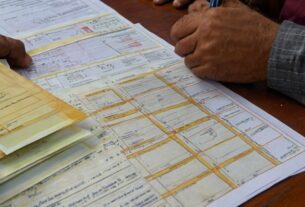Land Transfer Deed (Rajinama/Bakaspatra): Understanding the Process in Nepal
A land transfer deed, commonly referred to as Rajinama or Bakaspatra in Nepal, is a legal document that formally transfers ownership of a property (land or house) from one party to another. It ensures that the transaction is legally binding, recorded, and recognized by the government. Here’s a detailed guide to understanding and executing a land transfer deed in Nepal:
What is Rajinama/Bakaspatra?
- Rajinama refers to the transfer of land ownership, usually without monetary exchange, such as in cases of inheritance, gift, or family arrangements.
- Bakaspatra is the document formalizing such transfers, especially in the context of familial or non-commercial property transfers.
Both are essential to validate the change in ownership and avoid legal disputes in the future.
When is a Land Transfer Deed Needed?
- Inheritance: Transferring property to legal heirs.
- Gifting: Donating property to a relative or institution.
- Partition: Dividing property among family members.
- Sale of Property: Formalizing the transfer of ownership after payment.
- Exchange of Property: Swapping land or houses between two parties.
The Process of Land Transfer in Nepal
- Agreement Between Parties:
- Both parties (current owner and new owner) must agree to the terms of transfer, including ownership details and any conditions attached.
- Prepare Documents:
- Original Lalpurja (land ownership certificate).
- Citizenship certificates of both parties.
- Relationship proof for family transfers (if applicable).
- No Objection Certificate (NOC) from family members for inheritance transfers.
- Valuation and Taxes:
- Visit the Land Revenue Office (Malpot) for valuation.
- Taxes must be paid based on the government valuation or the transaction amount, whichever is higher. Common taxes include:
- Capital Gains Tax: Paid by the seller (7.5% of the profit for properties held for less than 5 years ,5% of the profit for properties held for more than 5 years, 20% for companies).
- Registration Fee: Paid by the buyer (1.5%-5% of the transaction value, depending on the province).
- Stamp Duty: Applicable at the time of registering the deed.
- Prepare the Transfer Deed:
- A lawyer or notary drafts the Rajinama or Bakaspatra, mentioning all details of the transfer, including parties involved, property description, and terms.
- Verification at Land Revenue Office (Malpot):
- Submit the deed and documents to the Land Revenue Office.
- Both parties must be present for verification.
- Registration of Deed:
- Upon verification, the deed is officially registered, and the new owner’s name is updated in the Lalpurja and government records.
- Get a Copy of the Updated Lalpurja:
- The new owner receives an updated Lalpurja, confirming their ownership.
Key Points to Consider
- Government Valuation vs. Market Valuation:
- Land transactions are often calculated using the government valuation (30/70 rule):
- Government valuation is typically 30%-40% lower than the actual market value.
- Taxes and fees are based on the government valuation, making property transfers cost-effective in terms of taxes.
- Land transactions are often calculated using the government valuation (30/70 rule):
- Legal Assistance:
- Hiring a real estate lawyer ensures accuracy in the deed and avoids disputes later. Lawyers charge based on the complexity of the transfer (flat fees or percentage of the property value).
- Verification Before Purchase:
- Check if the property is free from disputes, loans, or encumbrances.
- Digital Systems in Land Transfer:
- Some provinces in Nepal are moving toward digitizing land records and transfers to make the process more efficient.
Advantages of Completing a Land Transfer Properly
- Legal Security: Ensures the new owner’s rights are protected.
- Avoid Disputes: A formal transfer avoids family or third-party disputes over ownership.
- Ease of Selling or Leasing: Properly transferred properties are easier to sell or lease later.
Challenges in Property Transfer in Nepal
- Complex Bureaucratic Process: Requires navigating multiple offices and procedures.
- Undervaluation of Land: The 30/70 rule can create confusion in taxation and valuation.
- Fraud Risks: It’s crucial to authenticate all documents and parties involved.
At 4Killa Real Estate, we specialize in simplifying property transactions for our clients, ensuring legal compliance and a smooth process. Whether you’re buying, selling, or transferring property, we’re here to help. “जहाँ यहाँहरूका कठिनाइलाई हामी सहज बनाउँछौँ!”



